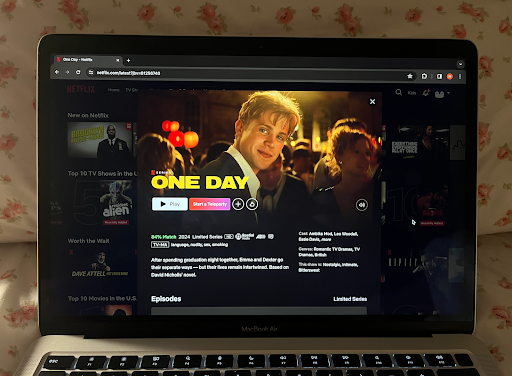
“One Day” is a heartbreaking story of love, regret and time. The Netflix limited series released on Feb. 8 is the second screen adaptation of “One Day,” originally a novel written by David Nicholls and an adaptation of the 2011 film starring Anne Hathway and Jim Sturgess. When first released the film received mixed reviews, generating doubt when Netflix announced the limited series. However, it surpassed 15.2 million views, becoming the most-viewed English series five days after its release.
The series follows two friends and lovers, Emma (Ambika Mod) and Dex (Leo Woodall), from their original meeting at the end of university through the next 20 years of their lives. Each episode occurs on the same day–July 15th–one year apart. This structure creates an interesting insight into the two throughout the 14 episode span. Spanning over two decades “One Day” is a beautiful commentary on how time changes people and alters one’s life.
Following the same storyline as the novel and film, the two have significant similarities. Despite the similarities, we get a more drawn-out and intense version compared to the film, allowing for more character development seen in Emma and Dex. We see the two grow up, become best friends and deal with their ambitions in life.
Throughout the series, Emma and Dex constantly engage in a will-they-won’t-they situation. From their original meeting as a failed one-night stand, the two become tied to one another with an undeniable bond. However, when one is ready to be romantically involved, the other isn’t.
The show quickly transforms into a right person, wrong time scenario. Despite the overall theme of heartbreak, viewers will gain aspects of hope throughout. Whether platonic or romantic, no matter where Emma and Dex are in their story, they still share love for one another.
A massive plus for the limited series is that a woman of color, Ambika Mod, plays Emma. It’s incredibly refreshing and well-needed to cast women of color in these romantic roles, which usually lack representation.
In an interview with the New York Times, Mod said, “Many people, when reading the book, wouldn’t have imagined a brown Emma, but I think that, if anything, it amplifies and puts a spotlight on the things that make her more relatable.”
With newfound representation, the limited series is a well-needed step forward from the film and novel. “One Day” is a heartbreaking yet beautiful representation of humanity, love and time lost. The limited series is now available to stream on Netflix. The film is available on Amazon Prime Video for viewers wanting more of this story.








